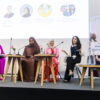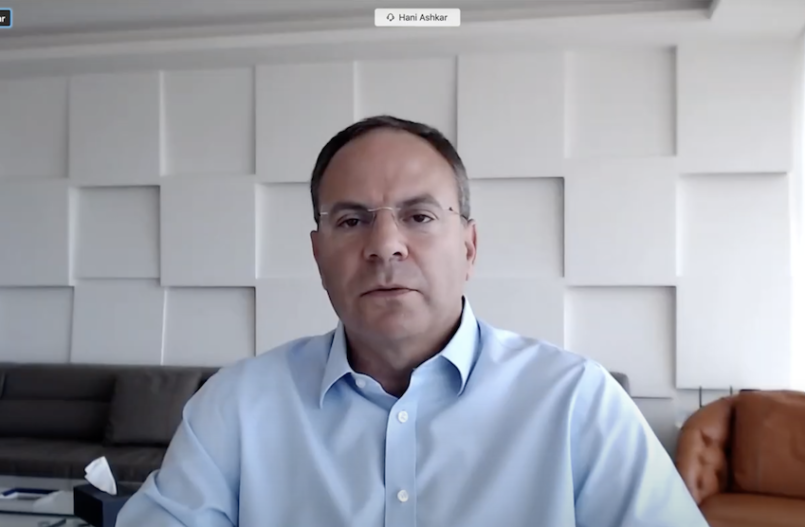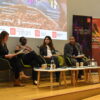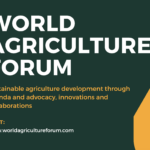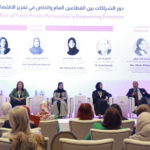With resilience of the economy and the challenges of the future labour market in mind, AIWF proudly collaborated with our Global Partner PwC Middle East on the fourth event of the series, Recovering from the Dual Shock of COVID-19 and the Oil Price Drop & Workforce of the Future: The Competing Forces Shaping 2030. The webinar was chaired by Haifa Al Kaylani, Founder & Chairman of AIWF; moderated by Hani Ashkar, Senior Partner, PwC Middle East; and addressed by Dr Yahya Anouti, Partner with Strategy&, who in the first part, shared leading perspectives on the dual impacts of COVID-19 and the oil price drop on the GCC from the economic, industry and Government response standpoints; and Carol Stubbings, Global Tax and Legal Services Leader, PwC Middle East, who elaborated on the ‘Workforce of the Future’ and on how businesses can shape viable, practical, diverse and inclusive solutions to future of work challenges in the MENA Region.
In her introduction, Mrs Al Kaylani acknowledged the many years of partnership between PwC and AIWF and conveyed the full appreciation of the AIWF Board to Hani Ashkar for his leadership on the joint session and as a longstanding and greatly valued member of the AIWF Board. She commended the PwC Middle East leadership team for its dedication to empowering women executives, supporting diversity, and driving inclusion in the workplace in the region. Hani Ashkar, in his opening remarks, said: “Our partnership with AIWF comes from our genuine belief in its mission, as we work towards a more diverse and inclusive future for our region.”
Dr Yahya Anouti then framed his segment of the session around the clear ‘wake-up call’ from the dual impacts of COVID-19 and the oil price drop on the GCC from the economic, industry and Government response standpoints. The pandemic, he said, had brought down oil prices which constituted a large proportion of GDP exports and government revenues, which had had a staggering effect on the economy. Dr Yahya said: “Around the world the pandemic has been a wakeup call to the imminent hazards and vulnerabilities that nations are exposed to, with the potential for double digit recession. Global trade and FDI are on an extreme accelerated decline and around 200 million jobs are vulnerable to loss globally. In addition to economic impact we see social impact related to food security, loss of income pushing people into poverty, and lack of access to essential health services. Covid-19 is not the first nor the last natural hazard we will be exposed to and in our history we have had climate change related hazards but we are now becoming more exposed to man-made hazards, terrorism and cyber-attacks – overall, it is a call to rethink vulnerability and resilience economic model in the region.”
“When I talk about the competitive advantage, many oil rich countries in the region have built their competitive strength and they need to extend these strengths into the future. Fundamentally”, said Dr Yahya, “people want a place to learn, innovate, to start up and retire; companies want access to talent and advanced technologies; we need an abundance of renewable low carbon resources and access to green tech; and importantly we need to develop circular and digitally enabled infrastructure. Talent needs to be developed from within the region, government policies and regulations need to be refreshed, we need to focus on innovation and R&D infrastructure, and rethink how we can operate an agile government model with all stakeholders aligned on one clear goal.”
Dr Yahya concluded: “The pandemic was a wakeup call and a unique opportunity to disrupt and innovative, to shift our paradigm in economic development towards inclusive growth, and towards empowering women’s contributions to the development agenda as well as enabling the contributions and inclusion of the most vulnerable populations in our region.”
Joining the webinar from the UK for ‘Workforce of the Future: Competing Forces Shaping 2030’ was Carol Stubbings, Global Tax and Legal Services Leader, PwC, who had led PwC’s thinking around the ‘Workforce of the Future’ study, which looked at four possible Worlds of Work for 2030. Carol said: “It is no exaggeration to say that Covid-19 has upended our entire world, altered the course of economies and societies around the globe in ways that we don’t fully understand just yet,” she said. “In everything from how to work, where work happens, how we use technology, work is being rebalanced. This is having massive societal implications around the world. Even before Covid-19 we were seeing widening skills gaps and mismatches between skills and the needs of the private sector”, key among these, she explained was the digital divide, which had the potential to leave those without digital skills excluded from employment.”
“We don’t want to leave whole swathes of people behind,” she said, “especially not in the MENA States where the female labour force participation rate of 24.6% is the lowest in the world, and half the global average.” Carol continued: “High inequalities persist in the region, in legal protection and financial inclusion especially, although levels of literacy and education is on par with men. Girls are outperforming boys at school, and in many Arab nations, change is happening. We can make work more inclusive, but an enormous collective effort is required.” During the pandemic, Carol shared, whole industries had been massively impacted and still were being negatively impacted, especially airlines, hospitality and other service industries. However, online retail and delivery services had experienced an unprecedented boon.
“What we are seeing now is a competitive race to automation, digitisation, and real accelerated business transformation, reconfiguring for the future and building in organisational resilience for future crises; “moving”, she said, “from just in case, to just in time.” There was a need, Carol said, for tech skills to increase by 50%, and social and emotional skills up by 25%. PwC research shows that CEOs rank transferrable skills, problem solving, creativity, innovation, leadership, and adaptability as most critical, in-demand skills, alongside digital and technical skills – but those are the most difficult skills to hire for.”
Carol concluded with a key insight on digitisation and women’s entrepreneurship and how, with the increase of digitisation, more digital roles would be opening up, leaving women at high risk of displacement if they had no digital skills. Through women’s entrepreneurship, she said, we can “unlock female business creation and drive up female labour force participation, because women-owned businesses hire more women.” In addition, she called for greater emphasis on STEM education in the region – “if we know that there will be more of a requirement for STEM skills in the workforce than we need more young people in STEM education now.”
The AIWF Board extends its thanks and appreciation to Hani Ashkar, Dr Yahya Anouti, Carol Stubbings and the valued team at PwC Middle East for PwC’s partnership on this important joint initiative which truly demonstrated PwC’s thought leadership in critical areas of economic concern for the region.


